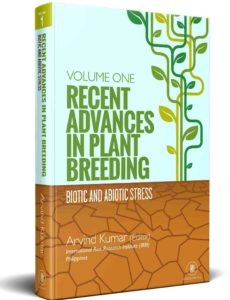The use of biotechnology in incorporating abiotic stress tolerance in crop species depends on a better understanding of the physiology of stress tolerance, and the identification of specific genes determining tolerance to a specific stress. The complex in heritance of stress tolerance hinders the immediate impact of biotechnologists introducing any novel genes. However, molecular markers may well serve in manipulating quantitatively inherited traits of stress tolerance physiological processes such as source sink relationships, translocation, and interrelations between plant parts, water status, hormonal levels and balance are crucial in determining a plants responses to stress. It is important to know the extent to which stress tolerance genes enhance the breath of adoption to stress, and whether they increase or decrease tolerance to stress. Abiotic stresses elevate levels of heat shock, cold or anaerobic response proteins for long periods but the question remains will expression of response proteins ahead of stress really protect plants. Breeding for stress tolerance is hampered by the breeders capacity in selecting for stress tolerant
Understanding abiotic stress factors such as temperature and drought tolerance and abiotic stress tolerance traits is an important factors on the crop productivity of crops. The present 2 volume book is an assemblage of scientific knowledge information which is written by eminent researchers in their respective fields. Its describes related methods for the creation, selection and fixation of superior plants in the development of improved cultivars suited to the needs of growers and consumers. The present volumes will be highly useful for the researchers, agronomists, plant physiologists, biotechnologists and agriculturists to sustain the crop production.
VOLUME–1
1. Genetic Resources: The Basis for Sustainable and Competitive Plant Breeding 2. Plant Breeding for Organic Agriculture: Something New? 3. Strategies to Increase Vitamin C in Plants: From Plant Defense Perspective to Food Biofortification 4. The Road to Micronutrient Biofortification of Rice: Progress and Prospects 5. Roles of Plant Metal Tolerance Proteins (MTP) in Metal Storage and Potential use in Biofortification Strategies 6. Recent Advances in Fruit Crop Genomics 7. Advances in Functional Genomics for Investigating Salinity Stress Tolerance Mechanisms in Cereals 8. Recent Trends and Perspectives of Molecular Markers against Fungal Diseases in Wheat 9. Molecular Characterization of Transgenic Events Using Next Generation Sequencing Approach 10. Lab to Farm: Applying Research on Plant Genetics and Genomics to Crop Improvement 11. Complete Sequence and Comparative Analysis of the Chloroplast Genome of Coconut Palm (Cocos nucifera) 12. Plant Plasma Membrane Proteomics for Improving Cold Tolerance
13. QTs for Tolrance of Drought and Breeding for Tolerance of Abiotic and Biotic Stress: An Integrated Approach 14. Allele Diversity for Abiotic Stress Responsive Candidate Genes in Chickpea Reference Set Using Gene Based SNP Markers 15. Recent Advances in Utilizing Transcription Factors to Improve Plant Abiotic Stress Tolerance by Transgenic Technology 16. Subcellular Protein Overexpression to Develop Abiotic Stress Tolerant Plants
VOLUME–2
17. Application of Genomics-assisted Breeding for Generation of Climate Resilient Crops: Progress and Prospects 18. Phenotyping for Drought Tolerance of Crops in the Genomics Era 19. Phenotyping Maize for Adaptation to Drought 20. Breeding and Domesticating Crops Adapted to Drought and Salinity: A New Paradigm for Increasing Food Production 21. Protective Mechanisms of Heat Tolerance in Crop Plants 22. Rice Breeding for High Grain Yield under Drought: A Strategic Solution to a Complex Problem 23. Genetic Engineering for Viral Disease Management in Plants 24. Metabolomics in Plants and Humans: Applications in the Prevention and Diagnosis of Diseases 25. Plant Breeding can be made more Efficient by having Fewer, Better Crosses 26. Molecular Effects of Resistance Elicitors from Biological Origin and their Potential for Crop Protection


